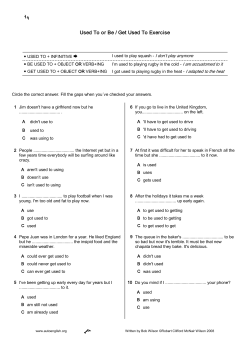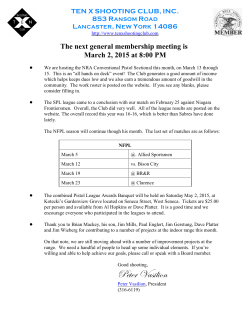
DBQ on Treaty of Versailles
Name: Date: Period: NE ____ A DBQ on the Failure of the Treaty of Versailles: Who Was to Blame: President Wilson or the Liberal & Conservative Opposition? Background: The Document Based Question (DBQ) which follows was taken from the 1991 Advanced Placement U.S. History Exam. You will have 60 minutes to complete the DBQ. The first 15 minutes will be devoted solely to reading and analyzing the documents. The remaining 45 minutes are devoted to writing the actual essay. As with all APUSH DBQ’s, you should prepare your answer by: 1. Determine the TIME and TASK based on the DBQ prompt. 2. Before looking at the documents: • Write a draft thesis statement that includes 2-3 categories of focus. • Create a 2-3 column chart. Each column in the chart should contain a heading that matches your 2-3 categories of focus. • Outline the body paragraphs by listing “outside info” (concrete details) in the appropriate columns in the chart. 3. Read each document and annotate how the main idea being expressed in the document helps to address the prompt. 4. List each document in the appropriate column in your 2-3 column chart. 5. Update your thesis statement and categories of focus (if necessary) based on your reading of the documents. 6. Write the essay. Be sure to include: • Introductory paragraph that build to your thesis statement and categories of focus. • Toulmin body paragraphs that contain at least TWO “chunks” of concrete details and commentary. • References the documents to support your concrete details and commentary. Do NOT quote the documents, describe the documents, or “bring them to life.” • Concluding paragraph that restates the thesis and recaps the main ideas of the body paragraphs. Directions: The following question requires you to construct a coherent essay that integrates your interpretation of Documents A-I and your knowledge of the period referred to in the question. High scores will be earned only by essays that both cite key pieces of evidence from the documents and draw on outside knowledge of the period. It was the strength of the opposition forces, both liberal and conservative, rather than the ineptitude and stubbornness of President Wilson that led to the Senate defeat of the Treaty of Versailles. Using the documents and your knowledge of the period 1917-1921, assess the validity of this statement. Document A Source: William Borah, Speech in United States Senate, December 6, 1918. The first proposition connected with the proposed league is that of a tribunal to settle the matters of controversy which may arise between the different nations. Will anyone advocate that those matters which are of vital importance to our people shall be submitted to a tribunal created other than by our own people and give it an international army subject to its direction and control to enforce its decrees? I doubt if anyone will advocate that. . . . If you do not do so, Mr. President, what will your league amount to? In its last analysis the proposition is force to destroy force, conflic to prevent conflict, militarism to destroy militarism, war to prevent war. In its last analysis it must be that if it has any sanction behind its judgment at all. There is where the difficulty lies. . . . Document B Source: The New Republic , May 24, 1919. Liberals all over the world have hoped that a war, which was so clearly the fruit of competition and imperialist and class-bound nationalism, would end in a peace which would moralize nationalism by releasing it from class bondage and exclusive ambitions. The Treaty of Versailles does not even try to satisfy these aspirations. 'Instead of expressing a great recuperative effort' of the conscience of civilization, which for its own sins has sweated so much blood, it does much to intensify and nothing to heal the old and ugly dissensions. Document C Source: Woodrow Wilson, Speech, September 5, 1919. When you read Article X, therefore, you will see that it is nothing but the inevitable, logical center of the whole system of the Covenant of the League of Nations, and I stand for it absolutely. If it should ever in any important respect be impaired, I would feel like asking the Secretary of War to get the boys who went across the water to fight, . . . and I would stand up before them and say, Boys, I told you before you went across the seas that this was a war against wars, and I did my best to fulfill the promise, but I am obliged to come to you in mortification and shame and say I have not been able to fulfill the promise. You are betrayed. You have fought for something that you did not get. Document D Source: Herbert Hoover to Woodrow Wilson, November 19, 1919. I take the liberty of urging upon you the desirability of accepting the reservations now passed . . . . I have the belief that with the League once in motion it can within itself and from experience and public education develop such measures as will make it effective. I am impressed with the desperate necessity of early ratification. The delays have already seriously imperiled the economic recuperation of Europe. In this we are vitally interested from every point of view. I believe that the Covenant will steadily lose ground in popular support if it is not put into constructive operation at once because the American public will not appreciate the saving values of the Covenant as distinguished from the wrongs imposed in the Treaty . ... Document E Document F Source: John Maynard Keynes, Economic Consequences of the Peace , 1920. According to [the French) vision of the future, European history is to J:>e a perpetual prize-fight, of which France has won this round, but of which this round is certainly not the last. . . . For Clemenceau made no pretense of considering himself bound by the Fourteen Points and left chiefly to others such concoctions as were necessary from time to time to save the scruples or the face of the President [Wilson]. . . . ..The policy of reducing Germany to servitude for a generation, of degrading the lives of millions of human beings, and of depriving a whole nation of happiness should be abhorrent and detestable, even if it were possible, even if it enriched ourselves, even if it did not sow the decay of the whole civilized life of Europe. Document G Source: Woodrow Wilson, "Appeal to the Country," October 3, 1920. This election is to be a genuine national referendum . . . . The chief question that is put to you is, of course: Do you want your country's honor vindicated and the Treaty of Versailles ratified? Do you in particular approve of the League of Nations as organized and empowered in fhat treaty? And do you wish to see the United States play its responsible pa,rt in it? . . . [The founders of the Government] thought of America as the light of the world as created to lead the world in the assertion of the rights of peoples and the rights of free nations...This light the opponents Document H Source: W. E.B. Du. Bois, "The League of Nations," Crisis , March, 1921. Forty-one nations, including nearly every Negro and mulatto and colored government of the world, have met in Geneva and formed the assembly of the League of Nations. This is the most forward-looking event of the century. Because of the idiotic way in which the stubbornness of Woodrow Wilson and the political fortunes of the Republicans became involved, the United States was not represented. But despite its tumult and shouting this nation must join and join on the terms which the World lays down. The idea that we single-handed can dictate terms to the World or stay out of the World, is an idea born of the folly of fools. Document I Source: Jane Addams, Peace and Bread in time of War, 1922. The League of Nations afforded a wide difference of opinion in every group. The Woman's Peace Party held its annual meeting in Chicago in the spring of 1920 and found our Branches fairly divided upon the subject. . . . The difference of opinion was limited always as to the existing League and never for a moment did anyone doubt the need for continued effort to bring about an adequate international organization.
© Copyright 2025













